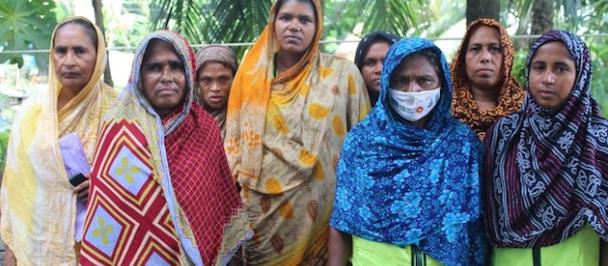Charting a Resilient Future: Collaborative Dialogues and Actionable Strategies at the Regional Climate Summit 2023
Strengthening Resilience in Bangladesh: Insights from the Regional Climate Summit 2023
September 26, 2023

Anowarul Haq, Assistant Resident Representative - Democratic Governance
BY Anowarul Haq, Assistant Resident Representative - Democratic Governance
Amena,(fictitious name), a 40-year-old resident of Kurigram, faced a heart-wrenching choice as her village near Manush Marar Char fell victim to an encroaching river. With her husband and three children, she left her ancestral home for Dhaka, where they settled in a cramped Mirpur slum, struggling daily for clean water and fresh air. Dhaka, though a bustling capital, offered little warmth. Yet, hope persisted - the dream of returning home. Amena's story, , reflects the reality of countless others forced by climate disasters to seek refuge in urban areas.

Portrayal of Resilience: A striking visual of the fictional character Amena, whose narrative symbolizes the face of climate-induced displacement in Bangladesh, beckoning a call for sustainable, resilient solutions.
A Gathering of Minds: Regional Climate Summit 2023
I attended the Regional Climate Summit 2023 in Dhaka, Bangladesh, which was held on September 8, 2023 and brought together international organisations, government representatives, and members of civil society. In order to increase resilience against climate impacts, participants in the session "Strengthening Resilience: Addressing Climate Impacts, Loss and Damage, and Locally Led Adaptation for Promoting Sustainable Development" developed a collaborative strategy.Breaking Down Silos: A Unified Approach
The discussion underscored the need to move away from isolated climate strategies in Bangladesh, advocating for a unified "Whole-of-Government" and "Whole-of-Society" approach to infuse climate resilience into all aspects of governance and community life.
To effectively tackle climate impacts, a holistic strategy was highlighted, one that integrates loss and damage considerations with adaptation strategies. Close collaboration among ministries responsible for climate, environmental issues, disaster management, and local governance is key to creating a comprehensive response to multifaceted climate challenges.
Empowering Local Adaptation
The session stressed the importance of locally led adaptation, recognizing the complexity of climate change and the need for community-driven responses. Communities themselves must spearhead the conception and execution of adaptation solutions.
Participants emphasized prioritizing actionable solutions over prolonged problem discussions. A harmonious blend of top-down policy initiatives and bottom-up, community-driven approaches can bridge the gap between scientific knowledge, technological advancements, and the immediate needs of citizens.
Addressing Urban-Rural Linkages
With climate-induced internal displacement and migration on the rise in Bangladesh, urban centers must be prepared to accommodate displaced populations like Amena. Understanding migrants' vulnerabilities and the linkages between urban and rural areas is crucial.
Engaging Youth
Youth engagement took center stage, highlighting their significant role in driving climate action. Calls were made for the establishment of regional and global platforms to facilitate knowledge exchange in pursuit of the global public good.
Chandpur: A Case Study in Climate-Induced Displacement
Chandpur, accessible to those from remote coastal districts, emerged as a significant case study. It has become a hotspot for climate-induced displacement, with unplanned settlements posing adaptation challenges. The Municipality of Chandpur pioneered innovative models for climate-resilient infrastructure and flood-resistant housing, involving communities in a collaborative process. Limited resources necessitate support from the Local Government Division and development partners to effectively scale these models.
The Private Sector's Role in Financing Adaptation
The presentation on the "Adaptation Economy" by a global bank was a highlight of the event. By forecasting a global demand of $30.4 billion by 2030, with $1.2 billion allotted to Bangladesh, the report underlined the importance of making significant investments in adaptation. The growth of finance mechanisms and the private sector's dedication to climate adaption were highlighted. Utilizing the Climate Vulnerability Index and Nature-Based Solutions
The Climate Vulnerability Index developed by UNDP in partnership with the Local Government Division and the Embassy of Sweden was highlighted as a valuable tool for guiding funding decisions to support vulnerable communities. Participants also stressed the importance of promoting climate-adaptive livelihoods and enterprise development.
Empowering Communities and Establishing a National Platform
It was noted that the Climate Vulnerability Index, created by UNDP in collaboration with the Local Government Division and the Swedish Embassy, is a useful instrument for assisting in the decision-making process for allocating cash to assist vulnerable communities. Participants emphasised the significance of encouraging the establishment of businesses and livelihoods that are climate-adaptive. A Model for Affordable Housing
In the context of providing low-cost housing for the urban poor, the spotlight fell on the Livelihoods Improvement of Urban Poor Communities Project (LIUPCP), led by the Local Government Division. This project, currently developing facilities in four cities, serves as a valuable learning opportunity with the potential for expansion. Technical support from UNDP through FCDO/UK Government underscores a collaborative approach to addressing housing needs and sets a model for future endeavors.
Future Financing and Urban Planning
With official development assistance dwindling, panelists emphasized the need for innovative financing mechanisms, including green and blue bonds. Integration of urban planning with climate discussions was recommended, advocating for holistic and integrated approaches to climate resilience.

Confluence of Minds: Delegates and climate advocates converge at the Regional Climate Summit 2023 in Dhaka, orchestrating dialogues to foster resilience and adaptive strategies against the backdrop of Bangladesh's climate challenges.
A Resolute Bangladesh
The Regional Climate Summit 2023 showcased Bangladesh's unwavering commitment to confronting climate challenges. By embracing collaboration, innovation, and community empowerment, the nation aspires to construct a resilient future filled with hope for marginalized women, such as, Amena.
Information about panelists: https://rcs2023.org/strengthening-resilience-addressing-climate-impacts-loss-and-damage-and-locally-led-adaptation-for-promoting-sustainable-development/
Information about the Regional Climate Summit 2023: https://rcs2023.org/about/
Amidst the tides of climate adversities, the Regional Climate Summit 2023 beckons a harmonic blend of policy, community action, and innovative financing as catalysts towards a resilient Bangladesh, embodying the undying hopes of individuals like Amena.

 Locations
Locations



